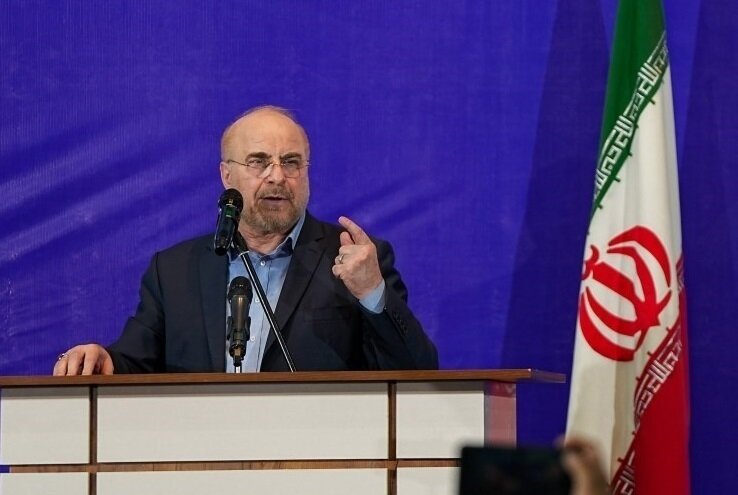Presidential frontrunner blasts Zarif for blaming JCPOA’s failure on parliament

TEHRAN – The leading candidate in Iran's upcoming presidential elections has vehemently denounced former Foreign Minister Mohammad Javad Zarif's claim that the revival of the 2015 Iran nuclear deal has been hindered by a bill passed by Iran's parliament 18 months after the United States withdrew from the agreement.
“Some say that the strategic act adopted by parliament prevented the revival of the JCPOA. Do these people have no shame? Right after the U.S. left the pact, they [Zarif and other Rouhani officials] held a press conference saying they would soon take action. Several months passed and they did nothing,” Mohammad Baqer Qalibaf said during a gathering with his supporters in the city of Qom on Sunday.
The Joint Comprehensive Plan of Action (JCPOA) was a deal on Iran’s nuclear program signed by Iran, the U.S., Britain, France, Germany, Russia, and China. It limited the West Asian country’s nuclear activities in exchange for the termination of sanctions.
Following Washington's announcement of its withdrawal from the Iran nuclear deal and the subsequent re-imposition of sanctions in 2018, the agreement collapsed. In an attempt to mitigate the impact of U.S. sanctions, European signatories to the deal pledged to establish INSTEX, a financial mechanism aimed at facilitating trade with Iran by bypassing the embargoes. However, after failing to facilitate any transactions, INSTEX was dissolved by Europe in 2022.
In December of 2020, the Iranian parliament adopted the Strategic Action Plan to Counter Sanctions law, ordering the government to gradually scale back on its JCPOA commitments in the face of Western noncompliance with the pact.
Zarif, whom analysts believe compromised on Iran’s nuclear program without receiving any reliable guarantees from the West, has blamed the failure of the JCPOA on multiple forces in the past years including parliament, Russia, and Iran’s military officials. He repeated his accusations against lawmakers during a TV appearance last week, where he had shown up as an advisor to reformist candidate Masoud Pezeshkian. “Unfortunately, Parliament’s strategic law prevented a return to the JCPOA,” he said.
“They used to warn that scrapping the Additional Protocol would bring us into war. Yet, when we canceled it and even enriched uranium to 20% and 60%, no war ensued. Rather, these bold actions compelled the West to acknowledge and engage in dialogue with us,” Qalibaf added while talking to his supporters.
Iran voluntarily implemented the Additional Protocol as part of its commitments under the JCPOA which granted the IAEA expanded access to information and locations within the country. It gradually ceased implementing some aspects of the Additional Protocol after Washington’s exit from the pact.
Pezeshkian seems to draw on politicization despite Leader’s warning
In his own gathering with voters, Pezeshkian said there are people within the country’s political circles who wish to see sanctions remain in place. “Those making money off of sanctions want us to remain under pressure so that they can continue stealing. We have to dismantle this [system],” he said without pointing to a specific group or individuals.
Pezeshkian’s remarks came a day after Leader of the Islamic Revolution Ayatollah Seyyed Ali Khamenei warned presidential hopefuls to refrain from making “enemy-pleasing” comments.
“The assumption is that all candidates love Iran and the Islamic Republic, that’s because they aspire to become president within this system and in order to serve the people,” he noted on Saturday.
Expanding on the meaning behind the Leader's reference to "enemy-pleasing" comments, an official from Ayatollah Khamenei's office explained that one instance of candidates appeasing the enemy is by deliberately fostering division on a particular issue to gain an advantage over their competitors. Specifically, the official cited the issue of sanctions termination, emphasizing that although all Iranian officials desire the removal of sanctions, a candidate could falsely accuse their rivals of supporting these embargoes while positioning themselves as the sole advocate dedicated to ending them. “This is a sort of politicization that will be detrimental to the country as a whole,” the official added.
Pourmohammadi talks to reporters at Tasnim
Sunday seemed to be a bad day for Pezeshkian and his entourage, as the only candidate holding views similar to him said the reformist would not be “suitable” to serve as the next president.
“I would consider utilizing [medical] experts like Mr. Pezeshkian in my government, but I do not believe he is the best fit for the presidency,” said Mostafa Pourmohammadi who is believed to belong to the moderate camp. He made similar assessments about Zarif. “While Mr. Zarif has proven himself to be a skilled diplomat, I do not believe he has the necessary qualifications to develop a comprehensive foreign policy strategy. He is better suited for a role as a negotiator or diplomat.”
During a press conference held in Tasnim news agency’s building, Pourmohammadi said he would continue the path of late President Ebrahim Raisi. “Every government has its own stance and policies. While I express my own viewpoints, I also acknowledge and respect the positions of Martyr Raeisi. He had a commendable approach to engaging with the people, and I intend to continue this approach.”
“Homemaking should be recognized as a job”
Conservative candidate Amir-Hossein Qazizadeh Hashemi used his Sunday appearance on TV to outline his economic and social plans in more detail.
His comments on the recognition of homemaking as an official occupation received huge appreciation. “Iranian women saw an exponential growth in education and employment after the Islamic Revolution. While this is admirable, one thing we have not paid enough attention to is the situation of the women who live as homemakers. We need to recognize homemaking as an official job because it has nothing short of other occupations,” he said.
Qazizadeh Hashemi did not explain how such ambitious plans would be made possible.
Leave a Comment